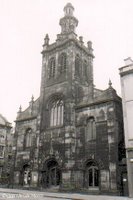Robert Rainy's long and eventful life was drawing to a close in that small room in Australia, far from Scotland and his beloved New College.
"I wonder at the love of God to me, as He has shown it all my life," Rainy said to a brother minister. To another he said, "I believe that, notwithstanding all my shortcomings, I am not shut out, but - shut in." On 22nd December, shortly before nine in the morning, Principal Robert Rainy of the New College, Edinburgh, left this world, his face bearing "a lofty calm that was not less than majesty". Looking down on his were his two predecessors, present in image. His body was taken back to Scotland for burial, and he was interred in the Dean Cemetery on 7th March 1907. Rainy was acknowledged as the United Free Church's greatest leader yet, an due to his leadership it seemed that the United Free Church was headed for great things.
In 1929 the majority of the United Free Church of Scotland united with the Church of Scotland, laving a minority who still clung to the old Disestablishment rhetoric. Both the majority and the minority appealed to Rainy's memory. Today Robert Rainy's medallion still looks down on a new generation of New College students as they meet in the Rainy Hall. For good or for ill, his legacy continues.
Most of the information in these articles was obtained from Patrick Carnegie Simpson's
Principal Rainy (2 volumes, London, Hodder and Stoughton, 1909). Other books consulted include James Lachlan Macleod,
The Second Disruption (East Linton, 2000), Alexander MacPherson (editor),
The History of the Free Presbyterian Church of Scotland (Glasgow, 1970),
One Hundred Years of Witness (Glasgow, 1993) and James Barr (not that one, the Labour MP),
The United Free Church of Scotland (London, 1934).
Robert Rainy Select Bibliography:
Three Lectures on the Church of Scotland (Edinburgh, John Maclaren, 1872)
The Delivery and Development Of Christian Doctrine (Edinburgh, T. & T. Clark, 1874)
The Bible and Criticism (London, Hodder and Stoughton, 1878)
'The Apostle Paul' in
The Evangelical Succession (Edinburgh, Macniven and Wallace, 1882)
The Epistle to the Philippians (London, Hodder and Stoughton, 1893)
Robert Rainy, James Orr, Marcus Dods,
The Supernatural in Christianity (Edinburgh, T. & T. Clark, 1894)
The Ancient Catholic Church (Edinburgh, T. & T. Clark, 1902)
Sojourning with God and Other Sermons (London, Hodder and Stoughton, 1903)
(These are the books by Rainy that you stand half a chance of actually being able to get hold of)
Labels: Principal Rainy



